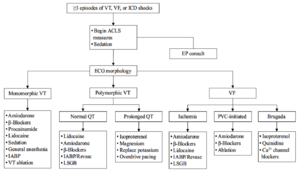Electrical storm: Difference between revisions
| Line 1: | Line 1: | ||
==Background== | ==Background== | ||
*Definition | *Definition | ||
**3 or more episodes of sustained [[ | **3 or more episodes of sustained [[ventricular tachycardia]], [[ventricular fibrilation]], or ICD shocks within 24 hours | ||
*Risk factors <ref> Brigadeau F et al. Clinical predictors and prognostic significance of electrical storm in patients with implantable cardioverter defibrillators. Eur Heart J 2006;27:700-7. </ref> | *Risk factors <ref> Brigadeau F et al. Clinical predictors and prognostic significance of electrical storm in patients with implantable cardioverter defibrillators. Eur Heart J 2006;27:700-7. </ref> | ||
**CAD | **CAD | ||
Revision as of 02:14, 2 June 2015
Background
- Definition
- 3 or more episodes of sustained ventricular tachycardia, ventricular fibrilation, or ICD shocks within 24 hours
- Risk factors [1]
- CAD
- HFrEF
- Long QT
- DM2 is protective
- Causes
- Ischemia
- Electrolyte derangement
- Iatrogenic (i.e. QT prolonging medications)
- Hyperthyroidism
- Infection/Fever
Clinical Features
- Presentation as:
- Cardiac arrest
- Palpitations
- (Pre)Syncope
- ICD patient complaining of shock(s)
Differential Diagnosis
- Tachycardia (wide)
- ICD malfunction
- AF/SVT
- Oversensing
- Lead fracture
Diagnosis
Management

Proposed treatment algorithm for electrical storm[2]
Disposition
- CCU or cath lab


